This is a short talk I was asked to give at a RailsGirls event in Salt Lake City on October 17, 2015. The requested subject was "Where to go from here?" It's possible the organizers wanted practical advice for participants on how they might keep going into a career in development, but when I said I wanted to talk about how women who code will literally and necessarily change the world, they accepted my talk.
This is a transcript.
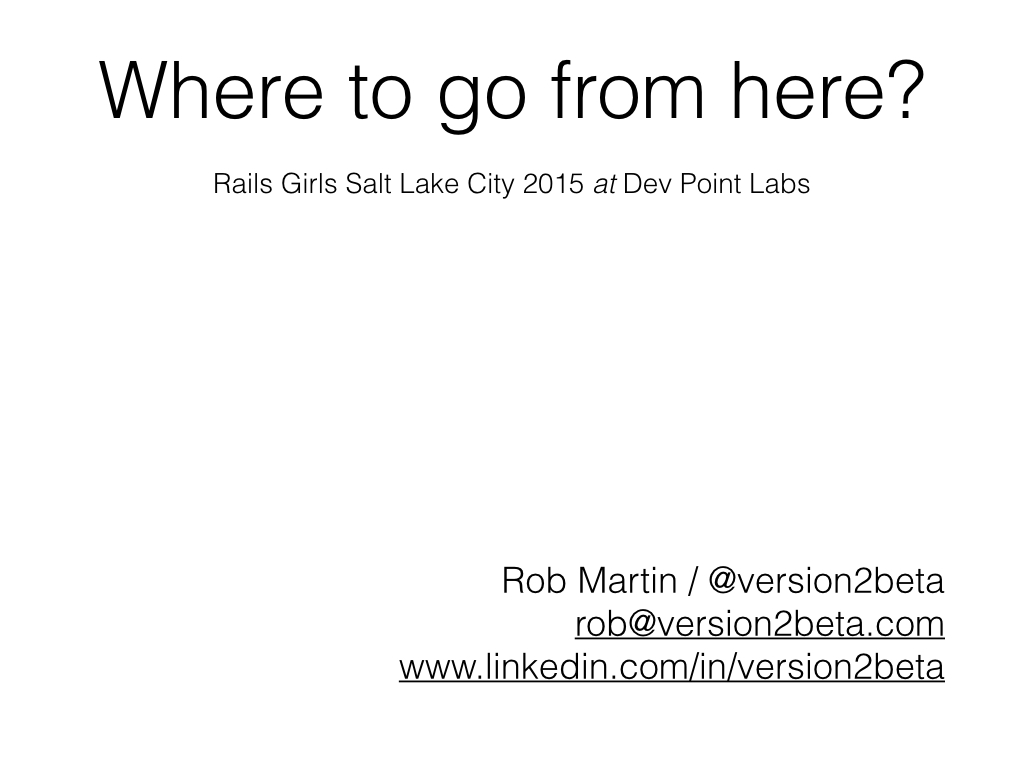
Hi, I'm Rob Martin, otherwise known as Version2beta pretty much everywhere online, and the guy they asked to talk about where you can go from here.
I hope this weekend has been super successful for you, and that you decide to keep coding, to become a professional developer, or build that app you've been wanting to have, or just express yourself to a connected world. You've got lots of choices in the path you take to get there, and I'm not in a position to give you a road map because I only know a little about where you're at, and I know almost nothing about where you want to be.
But I think our organizers might have wanted me to talk about practical steps you can take to keep learning and keep coding. And that's important, so let's take thirty seconds and discuss a plan.
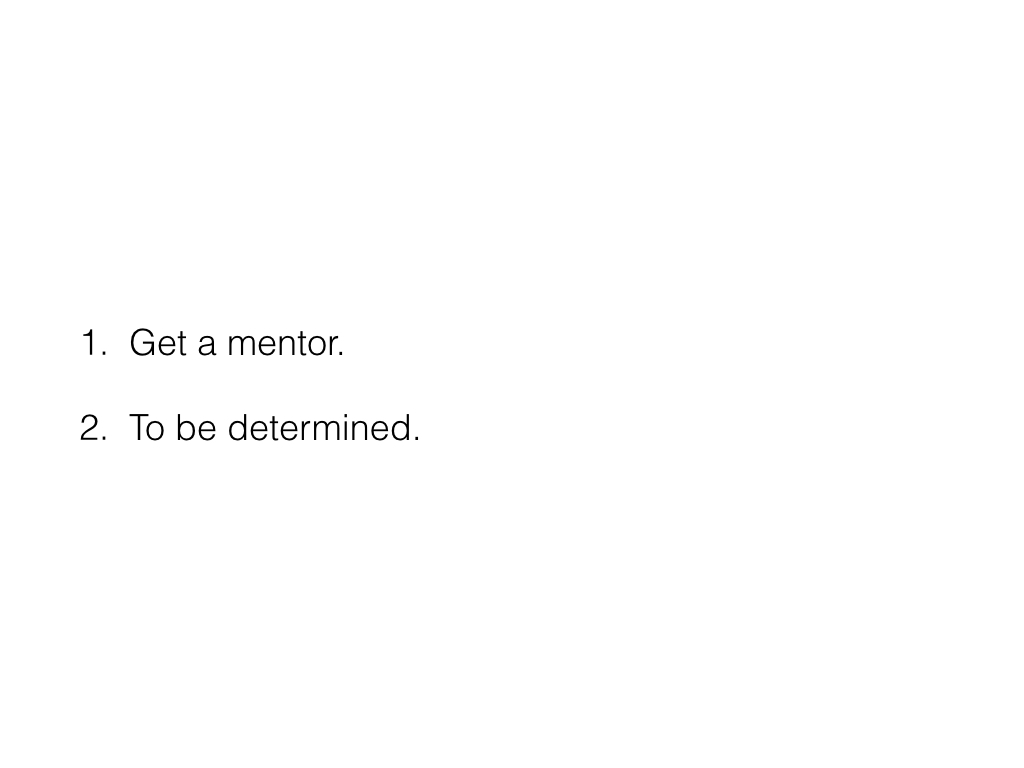
The facts are that if I knew more, I could help more. If we sat down and talked, I can help you find your path. That's true of pretty much every coach here.
So that's my plan for your next step. Get a mentor. Ask a coach here if there's someone you felt comfortable working with. Ask me if you want, or ask me to help you find someone who's a good match. And then share your dreams with your mentor and find your path.
Now let's talk about changing the world. And why you should hire me.
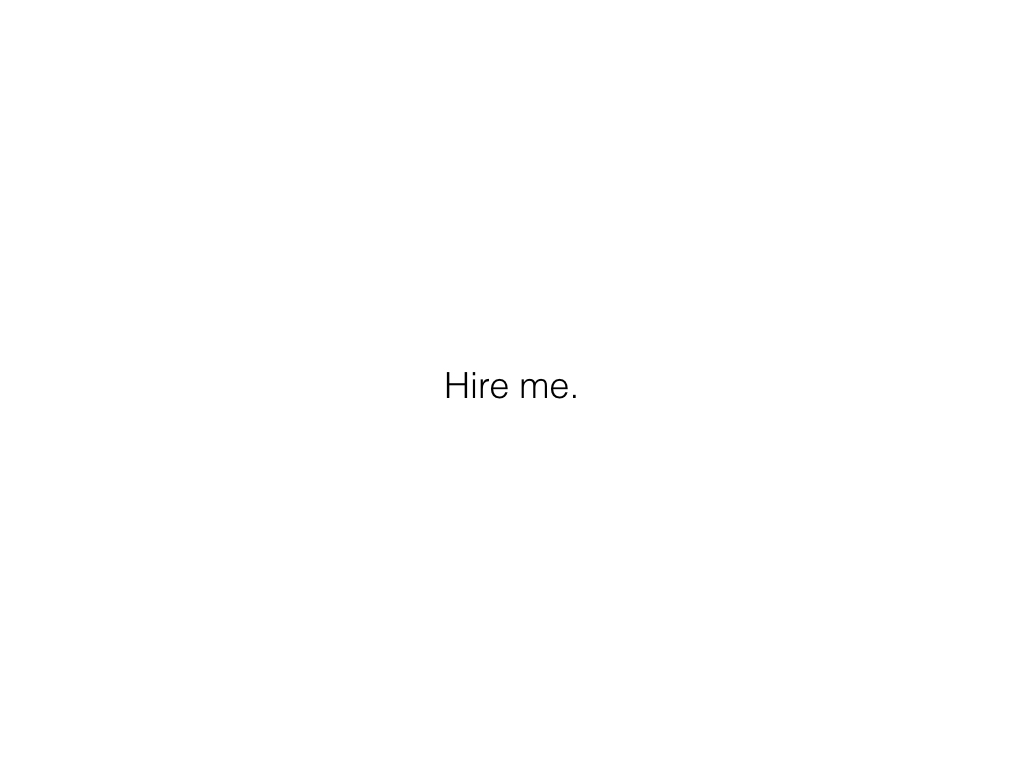
When you came here today, did you expect anyone to ask you for a job? Well, here I am. I want to work for you.
I have mad skills, of course because why else would I ask you for a job, but since this is a relatively short, large group interview, I'd like to talk about you instead of me. Specifically, why I want to work for you.
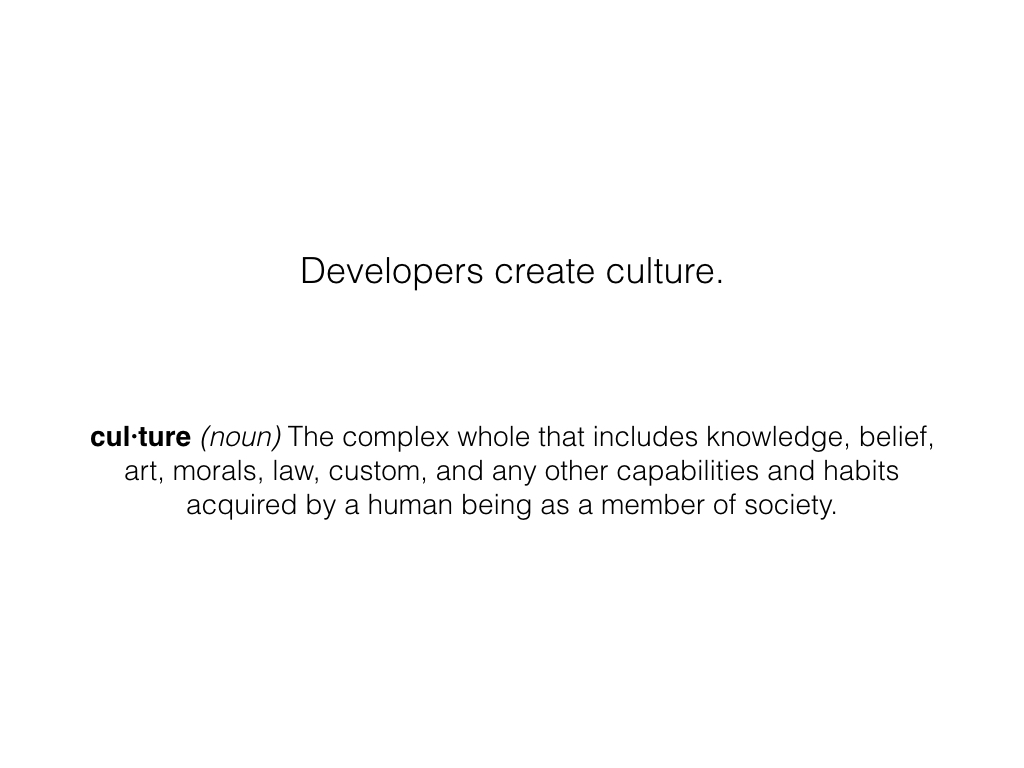
I'm kinda an old dude, and I've seen the world change a lot over the past 46 years. And I've spent a lot of time thinking about how that change happens.
I've seen us change from mom and pop downtowns to multinational online supermegastores.
I've seen us go from wall-mount rotary phones - really - to smart phones that put all my friends right here in my pocket.
I've seen us become constantly connected with each other in amazing ways, to have meaningful, rich interactions with each other across continents and decades.
I've seen us go from kids at playgrounds and hamburger joints to something like cyborgs. Our devices are now part of who we are. They put the cumulative knowledge of the human race into our hands. They connect us to each other, and create communities where we used to feel completely alone. And the people we reach through our devices, they are our tribe.
Developers did this. Developers changed how we relate to each other, and created opportunities for us to relate to new people organizing around things that didn't even exist when my kids were little.
Developers changed who we are.
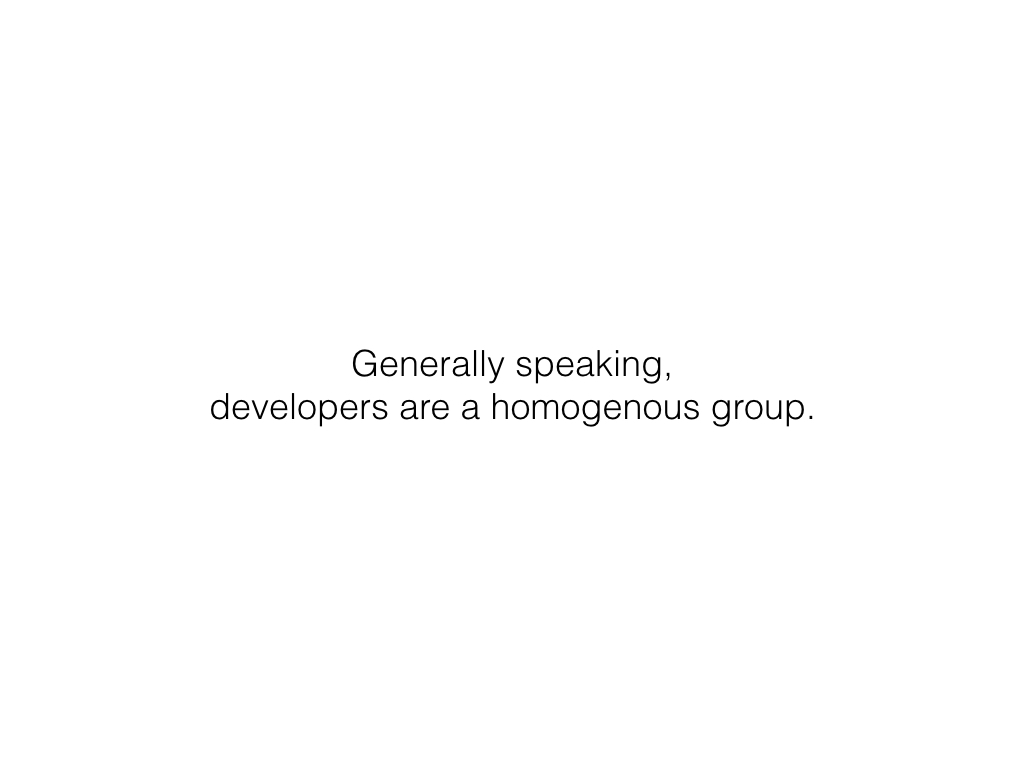
Of course, I know generalizations are always wrong. So it would be inaccurate for me to claim that all developers are white, straight, cis-gendered, relatively wealthy dudes. Still, this generalization is true too much of the time, and it's even more true when you look at the people who are directing the technology we're creating.
There are notable exceptions, but for the most part a bunch of rich, white, straight dudes are responsible for the creation of most of the technologies that have changed the world during my lifetime.
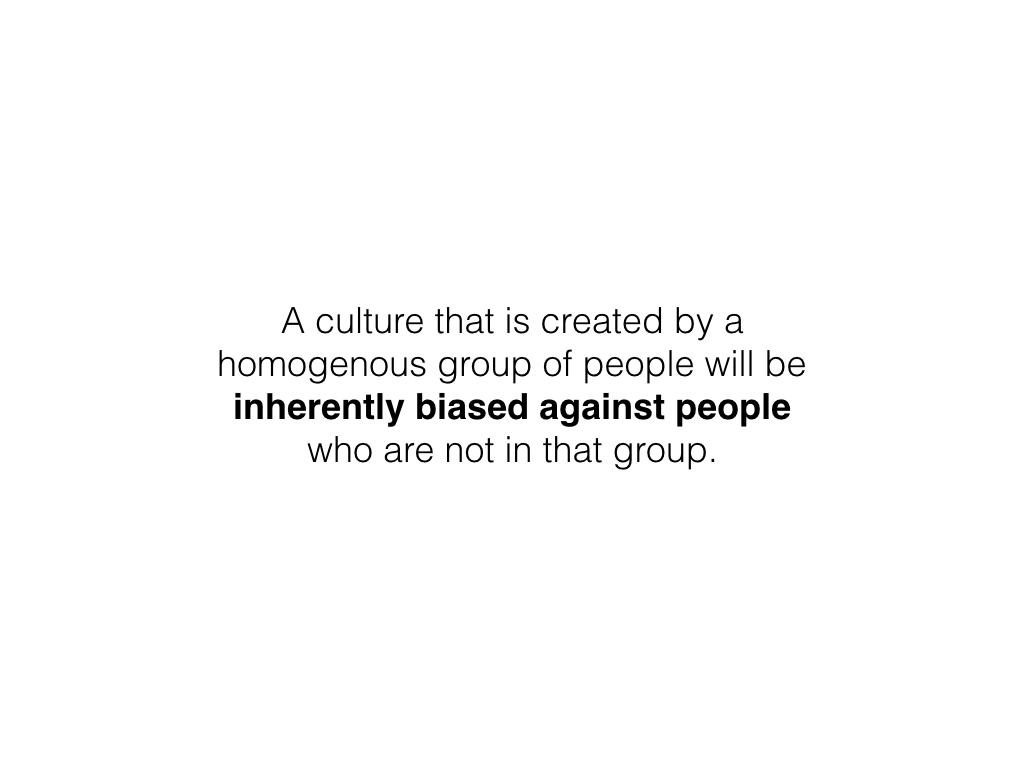
This may be obvious to you, but I'm slow: The less you have in common with the people who create a culture, the less power you have within that culture.
I don't know if you noticed, but I'm an upper middle class white guy. When I go to predominantly black or Latino neighborhoods in Milwaukee or Los Angeles, I don't have much cred. I don't have all that much in common with the people who make that culture so rich and so real.
The flip side is also true. The more you have in common with the people who create a culture, the more power you have within that culture. Maybe you're starting your programming career today, and if you are I applaud you. I can afford to. I have a 36 year head start on you, because I was fortunate enough to be a pimply, geeky white boy from a well-off family at exactly the same time that our culture was saying pimply, geeky white boys make cute hackers.
Becoming a developer was easy for me. The question I've been trying to answer for years now is, how do we make it easier for you, too.
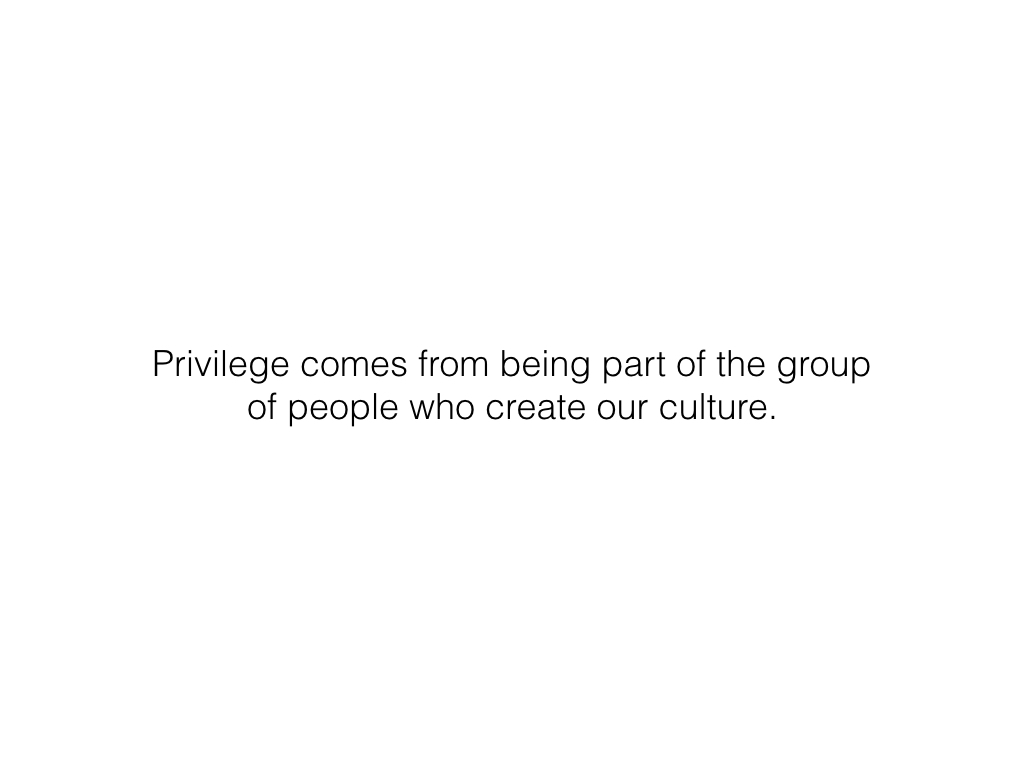
I'm talking about privilege, of course. I have a lot of privilege, and it's because of how much I have in common with the people who have been creating the culture that you and I both live in. I look like them. I have the same background as them. I have some mastery over the same tools they use.
I am them.
Being part of the group of people who create our culture is where I get my privilege, and it doesn't matter much what I do about it, I'm likely to keep a lot of that privilege.
I've seen people do some pretty stupid things with this privilege. You probably have too. I've done stupid things with my privilege, although hopefully not as horrific as some of the things I've seen other developers do.
One thing I can do with my privilege, however, is help change the group of people creating culture.
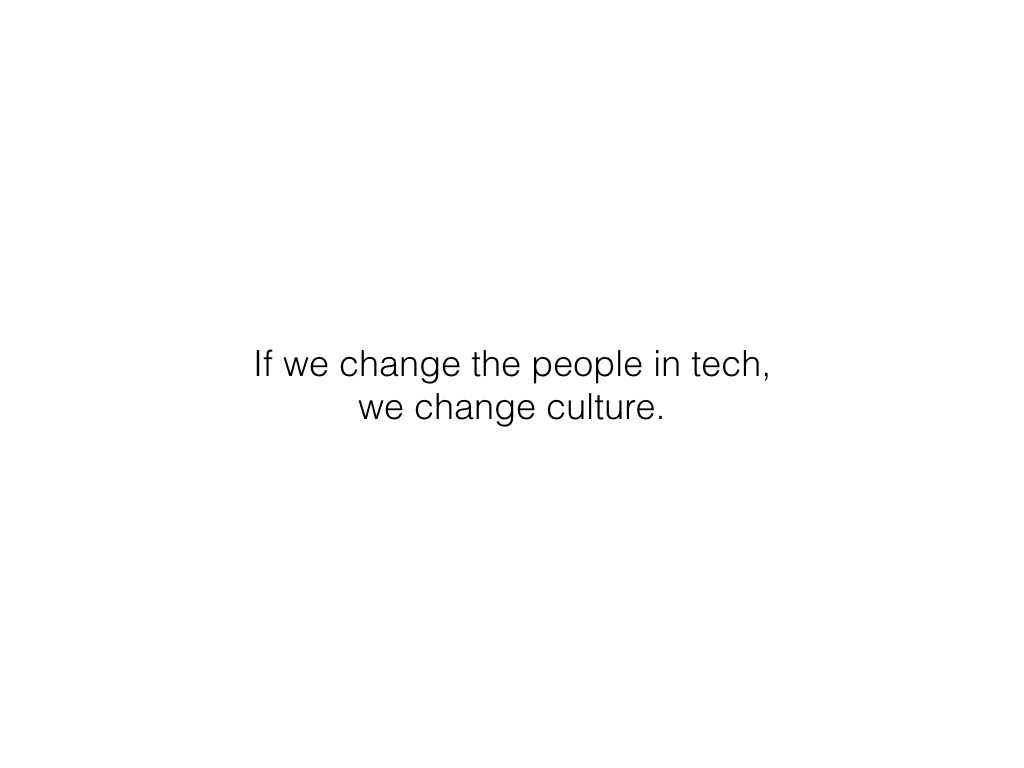
This is where you come in.
The more women who get into programming, the more influence women have over our culture. The more diversity we have in tech, the more inclusive our culture becomes.
I know this sounds like I'm saying you can do amazing things simply by being a woman in tech and that's true actually, because just by showing up you are helping us change what we think a developer looks like. I really hope it's only one of the ways you do amazing things.
By launching your programming career, by taking your first steps toward being a creator of computer programs and content, you are influencing our entire culture. Today, your influence may be small, but you are already making the world a better place. When you work your rear end off building your dreams, you'll be changing the world.
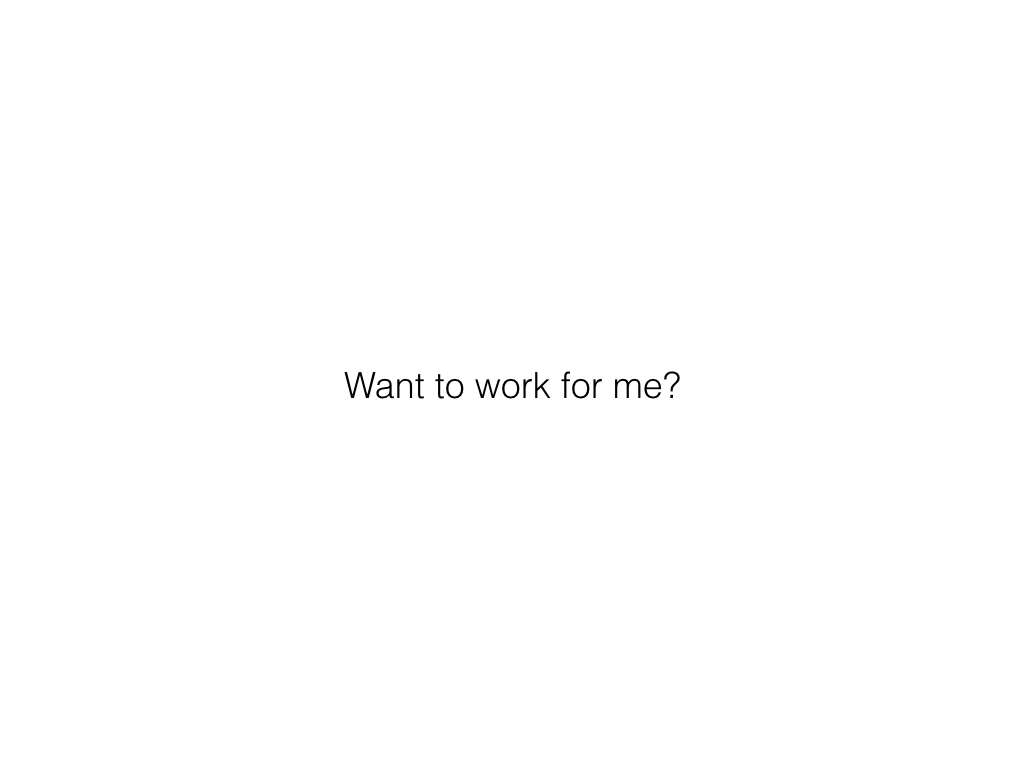
Maybe you don't want to start your own company. Maybe you just want to share in the fact that they pay us developers stupid amounts of money, and being smart folk to begin with, we don't turn it down.
As an industry, we're trying hard to change the way we work to stop making it hard for you. Really, we are, even though it's slow and isn't happening at the same rate everywhere.
We created our "company cultures" - I hate that phrase, it's usually used as a way to discriminate against people who aren't like us - we created our company cultures around the people who make it to the top. Early on, it was the geeks and freaks like Bill Gates, or Mark Zuckerberg, pimply boys from upper middle class families who identified with the early maker culture. Later, the smart white jocks and frat boys caught on with the opportunity to be rockstar ninjas with huge pay checks. But now we're finally recognizing that programming is a social activity that has huge impacts on society and individual lives. We're working in pairs, even in mobs sometimes. We recognize the value of empathizing with our customers, and we invite them to be part of our creation process. We value "domain expertise" and want to hire programmers who know about things that aren't programming, like community building and mechanical engineering and education and medicine and particle physics and parenting.
If your path is to become a programmer working for someone else, I want to work with you, and - true story - when I decide to hire you, one of the things I'm going to consider is whether or not I would want you to be my boss.
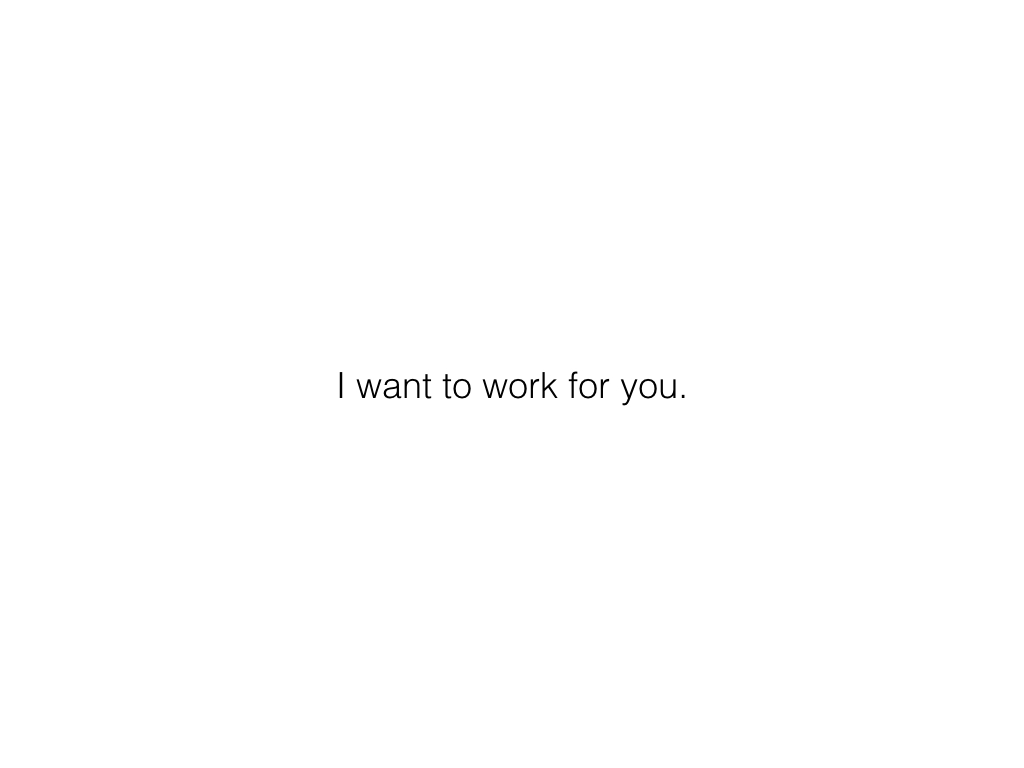
A bunch of people in this room are going to start their own companies - or already have. In spite of the fact that it might not be as easy for you as it has been for me, statistics say that quite a few of you are going to be successful.
I have the impression that it's getting easier, that tech is not as insular as it was in the heyday of brogrammers, that we're calling attention to the fact that women founders and CEO's aren't getting funded at anywhere near the rate that their male counterparts are.
We're calling attention to the fact that women who found and lead startups have 35% higher returns on investment and 12% higher revenue than their male counterparts. We're noticing that successful startups have twice as many women in top positions as startups that fail.
I think this means it's working. From 23andMe and Eventbrite and LOLapps and CodeForAmerica, all the way to the four incredible women interning on my team at OC Tanner, women are not only changing tech, you are changing culture.
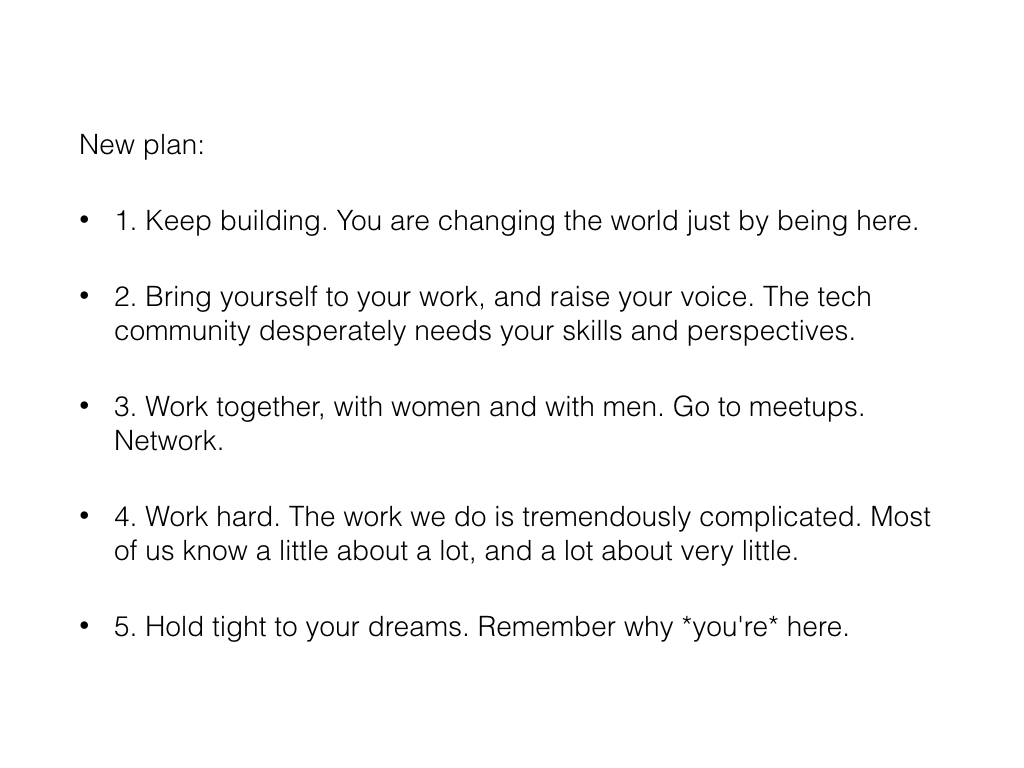
I told you I wanted to talk about you, but perhaps I just spent 15 minutes talking about how I want you to change the world. That's a lot of pressure, and it's not fair for me to ask that of you.
There's a rule about women in tech called "the unicorn law". The original version says that a woman working in open source software will sooner or later be asked to give a talk about being a woman working in open source software.
When I learned that rule, it changed my life. Before that I knew there were problems around diversity in tech - not just gender diversity, but all diversity. And I did almost nothing about it, because who am I to represent these under-represented groups of people, right?
That's when I realized that maybe a lot of people might like to get into programming because they like to program, not because they want to become activists. I also realized that it takes privilege to change culture, and expecting the people less privileged to make that change is completely unreasonable.
That's why I'm here today, and when I tell you I want to help you change the world, I mean that I want to help you learn to code. I want to help you get a job. I want to help you become a rockstar ninja, if that's your thing. I want to help you start a company. I want to help you build your dream.
You, being here, being yourself is what will change us. I'm really glad you're here. Thank you.
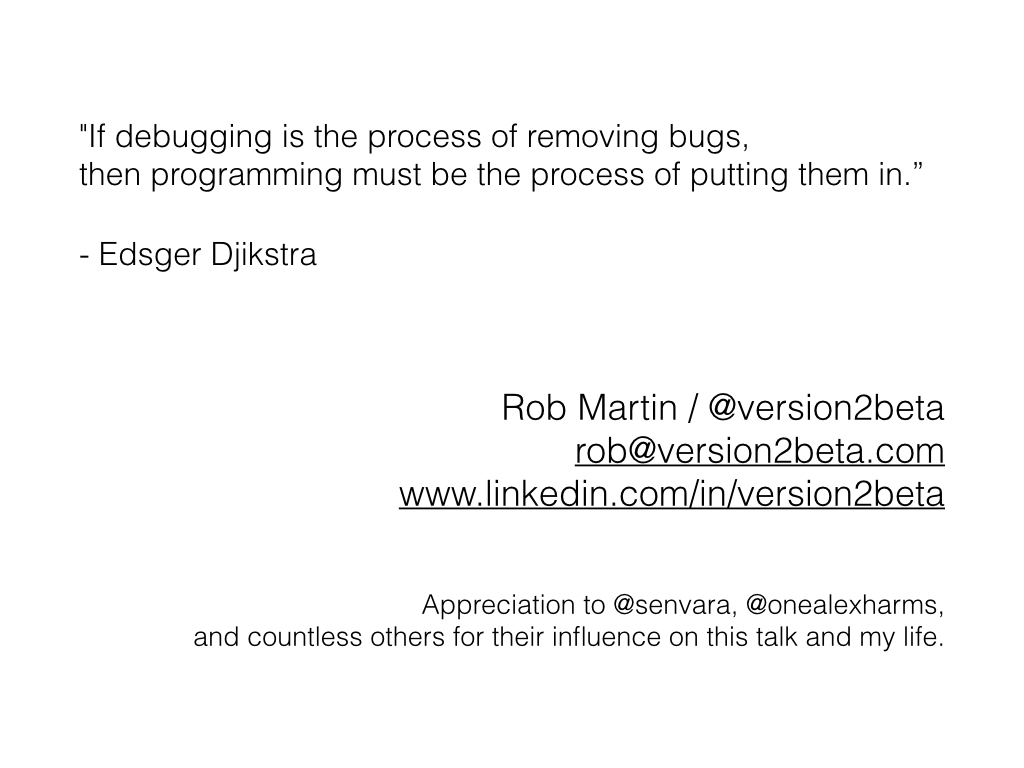
I want to thank you for the opportunity to be one of the first people to interview for the jobs that you're going to create. I understand that you might not be ready to offer me a job right away. Please, take the rest of the weekend to think about it. After that, I hope we can talk again about how to fit me into your plans for world domination.
I'm Rob Martin, version2beta online, and I want to help you change the world. Call me.
Talk back to me
You can comment below. Or tweet at me. I'm always open to a good conversation.